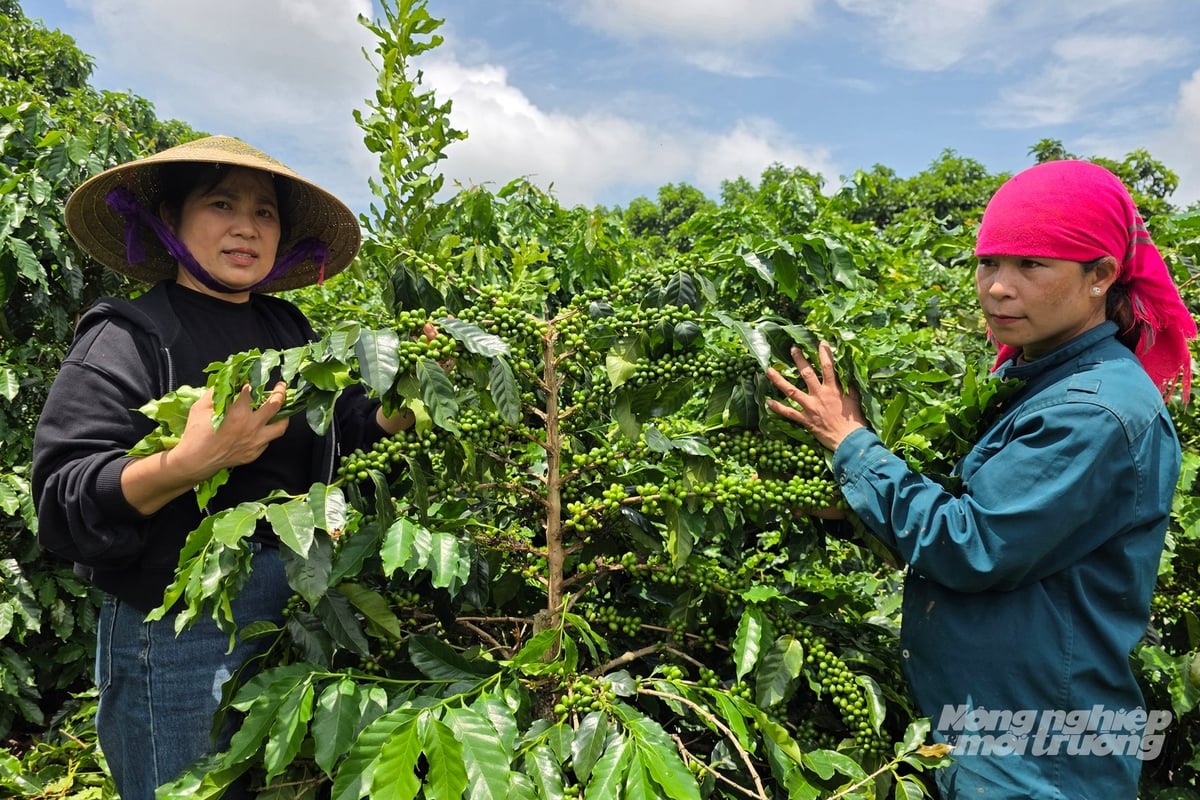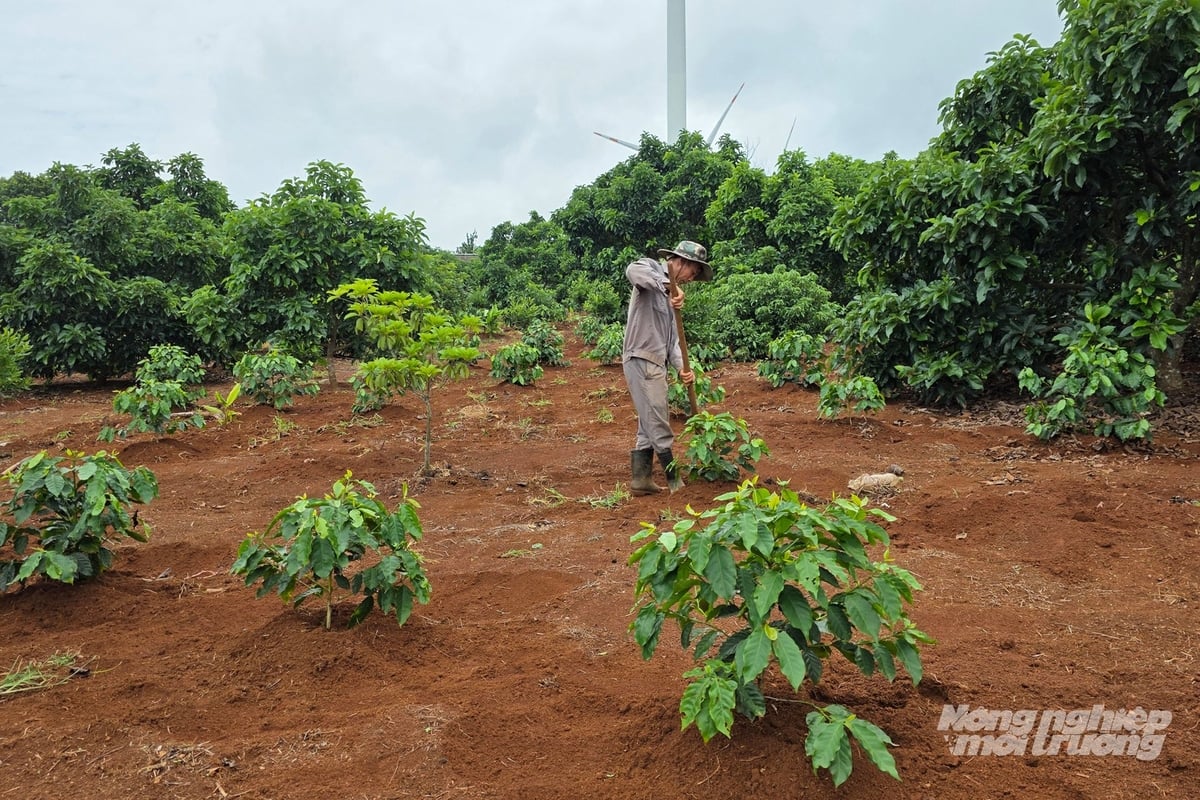November 19, 2025 | 21:56 GMT +7
November 19, 2025 | 21:56 GMT +7
Hotline: 0913.378.918
November 19, 2025 | 21:56 GMT +7
Hotline: 0913.378.918

Cultivating coffee without causing deforestation is a growing trend in the southwestern communes of Quang Tri province. Photo: Vo Dung.
Mrs. Ho Thi Xanh, residing in Tram hamlet, Khe Sanh commune, cultivates 0.5 ha of Arabica coffee. Over the past five years, with support from the Khe Sanh Agricultural Products Cooperative (HTX), she has switched to growing coffee that does not cause deforestation, following an organic approach. In addition to applying composted manure and organic fertilizers, Mrs. Xanh also interplants shade trees such as avocado and jackfruit to protect the coffee plants.
Although initial yields declined, they are now higher compared to traditional farming methods, and the Khe Sanh Agricultural Products Cooperative purchases the coffee at above-market prices. As a result, the value of her coffee garden has increased by 10–15 %. This benefit has encouraged Mrs. Xanh and many households in Khe Sanh commune to adopt this sustainable farming practice. But whether this can be sustained in the long term remains uncertain amid current coffee market challenges, especially when high-quality coffee still struggles to find export pathways.
“I also harvest avocado and jackfruit, which adds income. The coffee is purchased at higher prices than the market, so our family is very happy. We hope this continues so people can benefit. However, the Cooperative and businesses say exporting coffee remains difficult,” Mrs. Xanh worries.
To date, through three groups, the Khe Sanh Agricultural Products Cooperative has linked with 115 households growing coffee that does not cause deforestation, using organic methods over nearly 200 ha. Each year, the Cooperative purchases 700–1,000 tons of high-quality coffee. In 2025, the Cooperative’s processed Khe Sanh Coffee, made from high-quality, organic, deforestation-free beans, was recognized as a five-star OCOP product. However, directly exporting these products remains a long journey.
Mrs. Nguyen Thi Hang, Director of the Khe Sanh Agricultural Products Cooperative, believes that farmers can indeed grow high-quality, organic, deforestation-free coffee. Whatever coffee is grown sells out, but prices remain low and unstable, so cultivating remains unattractive. Therefore, to sustain this trend, support policies for coffee growers and enterprises are needed.

Coffee farmers and businesses need support to maintain and develop coffee cultivation without causing deforestation. Photo: Vo Dung.
Mrs. Hang emphasizes that to uphold the organic Khe Sanh coffee’s reputation, alongside investment in production, deep processing and brand building must be prioritized. Selling raw coffee beans only yields limited added value. Meanwhile, global markets are shifting toward roasted, ground or instant coffee and other processed products. If cooperatives and local businesses pursue this direction, farmers will benefit significantly.
In reality, businesses and cooperatives in southwestern Quang Tri still mostly sell domestically or export raw products via intermediaries. Accessing stable, direct customer bases is extremely challenging. The difficulties faced by businesses translate to limited benefits for coffee growers.
Another notable point is the growing global demand for green and sustainable products. Many international roasters and retail chains are willing to pay a premium for organic, deforestation-free coffee with transparent supply chains. Khe Sanh can leverage this advantage if it establishes a clear traceability system and participates in international certification programmes. However, achieving this requires stronger support from local authorities, functional agencies, and trade promotion bodies.
In addition, agricultural experts recommend that the Cooperative accelerate digital transformation in managing planting areas, using digital technology to monitor quality and thereby increase international customer confidence. When data on production volume, processes and certifications are transparent, Khe Sanh coffee will have more opportunities to reach major global roasting corporations instead of relying solely on intermediaries.
Organizing coffee festivals and product promotion fairs right in the local area is also an effective solution to spread the Khe Sanh Coffee brand. If coffee becomes a highlight linked to culture and community tourism, the product will not only remain an agricultural commodity but also become a cultural asset, encouraging farmers to stay committed to the trade for the long term.
The products are good, but the path to higher-value exports remains difficult. Therefore, the Khe Sanh Agricultural Products Cooperative hopes to receive support to enable direct export, step by step, increasing value to continuously elevate quality and reputation internationally.
“Khe Sanh coffee has long been famous and is increasingly improving quality by cultivating organic, deforestation-free coffee,” said Mrs. Nguyen Thi Hang, Director of Khe Sanh Agricultural Products Cooperative.
Translated by Huong Giang

(VAN) Over two days of operations, Region 1 forest rangers dismantled nearly 10,000 meters of nylon nets and released dozens of trapped wild birds.

(VAN) Viet Nam is looking to expand its cooperation with the International Institute for Sustainable Development (IISD) on climate change adaptation and the development of a carbon market.

(VAN) The two sides expect the reciprocal trade agreement to be finalized soon, creating a foundation for agribusinesses to expand their cooperation.

(VAN) Viet Nam’s entry into the ACF Alliance expands opportunities for agricultural innovation, knowledge exchange, and deeper international cooperation.

(VAN) Vietnam remains committed to sustainable development, maintaining a harmonious balance among economic growth, environmental protection, and climate-change response.

(VAN) Deputy Prime Minister Tran Hong Ha convened a meeting with the MAE and relevant agencies to discuss the draft decree on national multidimensional poverty standards for the 2026 - 2030 period.

(VAN) The year 2025 marks the 10th anniversary since more than 190 countries adopted the Paris Agreement on climate change, paving the way for strengthened global action.